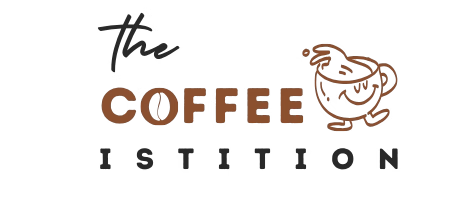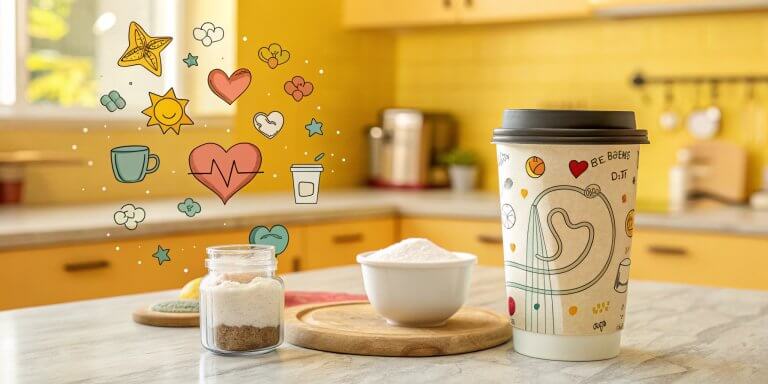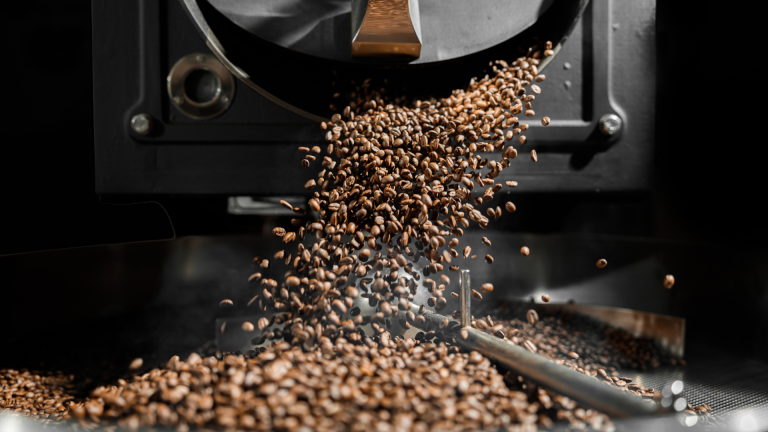
Ever wondered about carbs in coffee while sipping your morning brew? You’re not alone. I get this question all the time from fellow coffee lovers who are watching their carb intake.
Here’s the short answer: plain black coffee has less than 1 gram of carbs per cup. But the whole story is way more interesting than that simple number.
Let me walk you through everything you need to know about carbohydrates in coffee. We’ll cover different types, additives, and how your daily cup fits into your health goals.
Coffee Bean Carbohydrates
Here’s something that might blow your mind. Green coffee beans are actually packed with carbs – about 40-50% of their weight. That sounds crazy when you consider how many carbs in black coffee end up being almost zero, right?
The magic happens during roasting. Those complex carbohydrates break down into simpler compounds. Heat transforms them into the flavors and aromas we love. Most of these broken-down carbs don’t end up in your cup.
Think of it like cooking vegetables. Raw potatoes are full of starch. However, when you roast them, some of that starch breaks down into other compounds. Coffee works the same way.
Does coffee have carbs after this process? Yes, but very few. The final brewed coffee keeps only tiny amounts of the original carbohydrates. That’s why your morning cup won’t mess with your low-carb goals.
Instant coffee has a bit more. The processing method yields slightly more carbohydrates than regular brewing. But we’re still talking about less than a gram per serving.
Black Coffee Carb Content by Type
Let’s get specific about carb content in coffee. Different brewing methods give you different amounts:
| Coffee Type | Serving Size | Carbs (grams) |
|---|---|---|
| Regular brewed coffee | 8 oz cup | <1g |
| Espresso | 1 shot (30ml) | 0.5g |
| Cold brew | 8 oz cup | 2-4g |
| Instant coffee | 1 tsp powder | 0.34-0.64g |
| French press | 8 oz cup | <1g |
| Pour-over | 8 oz cup | <1g |
Cold brew is the outlier here. Why? The long steeping time pulls more natural sugars from the beans. While it’s still low-carb friendly, it’s not quite carb-free like hot coffee.
I love cold brew in summer. But if you’re counting every carb, stick to hot coffee or espresso.
Complete Carb Guide for Popular Coffee Shop Drinks
Real talk – this is where things get tricky. Your local coffee shop drinks can pack way more carbs than you think.
The pattern is clear. Black coffee keeps you safe. Everything else depends on what goes in it.
Pro tip: Ask for sugar-free syrups and milk alternatives to cut carbs. But even “sugar-free” isn’t always carb-free.
Where Carbs Really Add Up
This is where most people mess up their carb counts. The coffee isn’t the problem – it’s what you put in it.
I used to dump flavored creamer in my coffee without thinking. Those carbs add up fast when you’re have multiple cups.
Keto and Low-Carb Coffee
Good news for keto folks – black coffee fits perfectly in your diet. Carbs in a cup of coffee (black) won’t kick you out of ketosis.
The fats help with satiety and energy. I drink this when I’m doing intermittent fasting.
Hidden carbs lurk in “sugar-free” syrups too. Some contain maltodextrin or other carb sources.
Coffee and Blood Sugar: What Diabetics Need to Know
This gets personal. My dad has diabetes, so I’ve learned a lot about coffee and blood sugar.
The caffeine factor: Caffeine can make blood sugar spike in some people. It’s not the carbs – it’s how caffeine affects your body’s insulin response.
Black coffee safety: Plain black coffee has minimal impact on blood glucose. The tiny amount of carbs won’t cause spikes.
Timing matters: Some diabetics find coffee affects them more in the morning. Afternoon coffee might be gentler on blood sugar.
Always check with your doctor about coffee. Everyone responds differently.
Cold Brew vs Hot Coffee
Here’s some coffee science for you. Cold brew has more carbs because of how it’s made.
The extraction difference: Hot water pulls certain compounds quickly. Cold water takes 12-24 hours but extracts different things. Including more natural sugars from the beans.
Temperature matters: Heat breaks down some carbs during brewing. Cold extraction keeps more intact.
Taste impact: Those extra carbs in cold brew contribute to its smooth, slightly sweet taste. It’s not just marketing – there’s real science behind it.
Which is better?
I love cold brew in summer but switch to hot coffee when I’m being super strict with carbs.
Instant Coffee Carbs: The Convenience Trade-off
Let’s be honest about instant coffee. It’s convenient but has trade-offs.
Why more carbs? The manufacturing process concentrates some compounds. You get slightly more carbs per serving than brewed coffee.
Brand differences: Some brands have 0.3g per serving. Others hit 0.6g. Check the nutrition labels.
The bigger picture: Yes, instant has more carbs than brewed. But we’re talking about tiny amounts. If instant coffee fits your lifestyle, don’t stress over 0.3g extra carbs.
Best low-carb instant options:
I keep instant coffee for emergencies and travel. Those extra few tenths of a gram don’t worry me.
Coffee Carbs for Weight Loss and Fitness Goals
Coffee can be your weight loss friend or enemy. It depends on what you do with it.
The good news:
Pre-workout timing: I drink black coffee 30 minutes before the gym. The caffeine kicks in right when I need energy.
Post-workout considerations: Skip the fancy coffee drinks after exercise. Your muscles need protein, not sugar.
Celebrity secrets: Many fitness influencers drink bulletproof coffee for sustained energy. The fats keep you full without carb crashes.
Smart Coffee Ordering: Carb-Conscious Strategies
I’ve learned to navigate any coffee shop without blowing my carb budget.
Reading labels: When in doubt, check the nutrition facts. Many chains post them online now.
Common Coffee Carb Myths Debunked
Let me clear up some confusion I hear all the time.
Myth 1: “All coffee has zero carbs” Nope. Even black coffee has trace amounts. Cold brew has 2-4g per cup.
Myth 2: “Cold brew is always healthier”
Not necessarily. It has more carbs than hot coffee. “Healthier” depends on your goals.
Myth 3: “Sugar-free means carb-free” Wrong again. Some sugar-free syrups contain maltodextrin or other carb sources.
Myth 4: “Instant coffee is just as good nutritionally” Close, but instant has slightly more carbs. The difference is tiny though.
Myth 5: “Decaf has fewer carbs” The decaffeination process doesn’t change carb content. Decaf and regular have similar carbs.
Myth 6: “Coffee breaks a fast” Black coffee won’t break most types of fasts. Adding anything with calories might.
FAQ: Your Coffee Carb Questions Answered
How many carbs are in a cup of black coffee?
Less than 1 gram per 8-ounce serving. Most regular brewed coffee contains about 0.2-0.7 grams of carbs.
Does cold brew have more carbs than regular coffee?
Yes, cold brew typically contains 2-4 grams of carbs per cup compared to less than 1 gram in hot coffee. This happens because cold extraction pulls more natural sugars from the beans.
Which coffee additives are lowest in carbs?
Heavy cream (0.4g per tablespoon), MCT oil (0g), and stevia (0g) are your best bets. Avoid regular milk, sugar, and flavored syrups.
Can I drink coffee on a keto diet?
Absolutely! Black coffee, espresso, and coffee with heavy cream are all keto-friendly. Just avoid milk, sugar, and most commercial creamers.
Does instant coffee have more carbs than brewed?
Yes, instant coffee contains about 0.34-0.64 grams of carbs per serving compared to less than 0.23 grams in regular brewed coffee. The difference is small but measurable.
Will coffee kick me out of ketosis?
Black coffee won’t kick you out of ketosis. The minimal carb content (less than 1g) is too small to affect ketone production significantly.
What about espresso – how many carbs?
A single shot of espresso contains about 0.5 grams of carbs. Since espresso is concentrated, you’re getting similar carbs to regular coffee in a much smaller serving.
The Bottom Line on Coffee and Carbs
Here’s what matters most: plain coffee is naturally low in carbs. Whether you choose espresso, drip coffee, or even instant, you’re looking at less than 1 gram of carbohydrates per serving.
The real carb culprits are the add-ins. Milk, sugar, syrups, and fancy creamers can turn your innocent cup of coffee into a carb bomb.
My personal strategy? I drink black coffee most days. When I want something special, I add heavy cream or a natural sweetener like stevia. This keeps my carb count low while still enjoying great-tasting coffee.
For keto and low-carb dieters: You can absolutely keep drinking coffee. Just stick to black coffee, espresso, or coffee with keto-friendly additions.
For everyone else: Don’t stress too much about the trace carbs in plain coffee. Focus on limiting the sugary add-ins that really impact your daily carb intake.
Coffee has been part of human culture for centuries. A few carbs shouldn’t stop you from enjoying this amazing beverage. Just make informed choices about what goes in your cup.
Remember – life’s too short for bad coffee. Find the brewing method and additions that work for your health goals and taste preferences. Your perfect cup is out there waiting for you.
